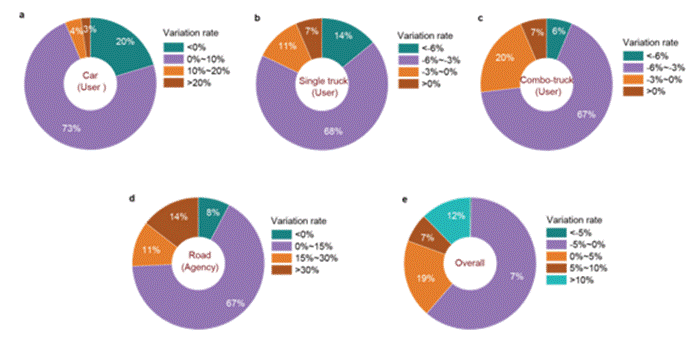On August 15th, a research paper "Truck platooning reshapes greenhouse gas emissions of the integrated vehicle-road infrastructure system" composed by Professor SUN Lijun from School of Transportation Engineering of Tongji University in cooperation with his counterparts from Hong Kong Polytechnic University, Missouri University of Science and Technology and Chalmers University was published in Nature Communications. The correspondent authors of this article are Professor SUN Lijun and Professor WANG Yuhong of Hong Kong Polytechnic University, while the first author is CHENG Huailei, a PhD student on a double-degree program jointly supervised by professors from the two universities.
Truck platooning is a new transportation technology, which can reduce the wind resistance and fuel consumption when vehicles are driving, thus reducing emissions. However, the interaction between platooned trucks and pavement facilities is different from that of conventional natural driving. Its impact on the total emission of the whole vehicle-road system, the damage of the road structure and the construction and maintenance cost remain unclear. On the basis of many years' research on road structure behavior, Professor SUN Lijun's team established a road damage model under the coupling action of platooning truck-service environment-road structure and a life-cycle carbon emission and cost model of platooning trucks-road system, and analyzed the carbon emissions and cost of road network-level road facilities of 1457 sections for 30 years.
Their research results show that the platooning technology can reduce truck emissions by 6.9%, but it will speed road damage and maintenance, resulting in an increase of 27.9% in road operation and maintenance emissions. The combined total emissions would be reduced by 5.1 percent, equivalent to a reduction of 76 tonnes of carbon dioxide equivalent (CO2-eq) per kilometre. At the same time, the maintenance and congestion cost of vehicle-road system increased by 4.6%, which brought different cost pressures to truck users, car users and road maintenance agencies. To this end, the research team proposed that new policy guidance is needed to balance the impact of truck platooning on emissions and costs of all parties. It is also necessary to propose new design methods of road structure and materials to reduce the influence of platooning technology on the durability of road facilities. The research results can provide a basis for the making of sustainable green transportation policy and the design of new long-life roads.

Impact of truck platooning on vehicle-road system cost
The research work was supported by the National Key R&D Program, the National Natural Science Foundation of China, the Research Funding Fund of the Hong Kong Research Grants Council and the Science and Technology Innovation Project of the Shanghai Municipal Education Commission.